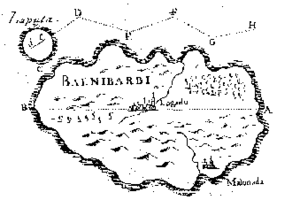Balnibarbi
| Balnibarbi | |
|---|---|

Balnibarbi (original map, Pt III Gulliver's Travels) showing the location of Laputa the flying island, Lagado the capital, and Malonada, the main port.
|
|
| Gulliver's Travels location | |
| Created by | Jonathan Swift |
| Genre | Satire |
| Type | City |
| Notable locations | Academy of Lagado |
| Notable characters | Lord Munodi (former governor) |
Balnibarbi is a fictional land in Jonathan Swift's satirical novel Gulliver's Travels. it was visited by Lemuel Gulliver after he was rescued by the people of the flying island of Laputa.
The location of Balnibarbi is illustrated in both the text and the map at the beginning of part III of Gulliver's Travels, though they are not consistent with each other. The map shows Balnibarbi to be an island to the east of Japan and to the northeast of Luggnagg. The text states that the kingdom of Balnibarbi is part of a continent which extends itself "eastward to that unknown tract of America westward of California and northward of the Pacific Ocean", and places it southeast of Luggnagg, which is "situated to the North-West" Gulliver gives his last known position (taken the morning “an hour before” he was captured by the pirates who set him adrift) as 46N, 183(E) (i.e. east of Japan, south of the Aleutian Islands) and was picked up by the inhabitants of Laputa just 5 days later, having drifted south-south-east down a chain of small rocky islands Gulliver also tells us that the island of Laputa flies by the “magnetick virtue” of certain minerals in the ground of Balnibarbi and does not extend more than four miles above, and six leagues beyond, beyond the limit of the kingdom. He states the Pacific coast, where lies the port of Maldonada, is not above one hundred and fifty miles from the capital, Lagado.
Gulliver describes the land of Balnibarbi as "a land unhappily cultivated, with houses ill-contrived and ruinous, and its people’s countenances expressing misery and want". He found its method of farming "unaccountable".
The exception to this was the estate of his guide, the Lord Munodi, a person of the first rank who had been governor of Lagado, but had been dismissed for insufficiency by a cabal of ministers. He had been treated with tenderness by the king, but held in low understanding. These estates were wholly different to the land as a whole, being "a most beautiful country, with houses neatly built, fields enclosed, containing vineyards, corn-grounds and meadows". However Munodi reported that he was under pressure to tear down his house and tenant farms and rebuild them in the modern manner, or be censured for pride and incur the wrath of his majesty.
...
Wikipedia
